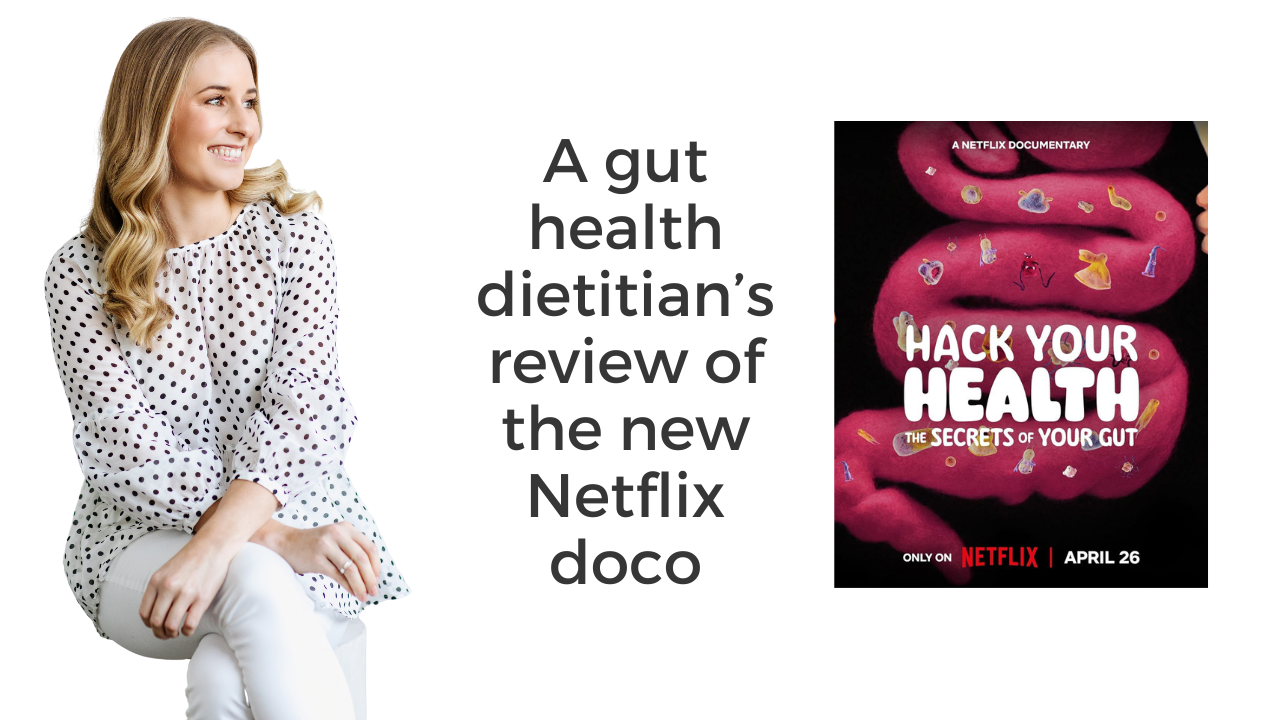A Dietitian’s review of Hack your Health: The Secrets of your Gut

Have you seen the new Netflix documentary? Maybe you’re interested in learning more about the gut, or you may be a health professional wondering what all the fuss is about, and whether we can trust the info in this doco. Look no further! In this review, I’m sharing a gut health dietitian’s perspective on it…
Let's start with the positives
Hack your Health: The Secrets of your Gut explores the intricate link between our gut and the rest of the body, bringing together experts in the field from doctors, researchers, neuroscientists and microbiologists. The calibre of experts, led by Dr Guilia Enders, along with Prof Tim Spector, Prof John Cryan, and others, meant the messages were evidence-based and trustworthy. Considering such an intricate topic as the gut microbiome, which we only know the tip of the iceberg about, I think they did an excellent job of communicating complex messages about the gut into simpler ones.
It was great to see that the documentary covered topics beyond how diet affects the microbiome, but also other factors like stress, the environment, nature and more, which we know can have a profound effect on our gut microbiome.
Disordered eating/eating disorders and gut health
The participants chosen to follow through the documentary were diverse, and they touched on a very interesting link: disordered eating/eating disorders and gut health.
They followed one person on the show with a past history of anorexia who is still recovering from disordered eating behaviours. This participant only eats veggies but no other food groups due to the gut symptoms she experiences from other foods.
Another participant also has chronic gut pain and has restricted her diet so much that she is only able to eat 10-15 foods in her whole diet. These behaviours are characteristic of an eating disorder known as ARFID (avoidant restrictive food intake disorder).
Gut issues and disordered eating/eating disorders are inextricably linked. Gut symptoms are really common in people experiencing eating disorders/disordered eating for a number of reasons, for example, muscle wasting in the gut can lead to a decreased functioning of the gut muscles, causing symptoms like constipation.
As well as this, gut disorders like IBS can also lead to eating disorders as people seek to achieve symptom relief by cutting out multiple foods, in turn creating a lot of fear around eating/food (as seen in the documentary). In fact, 20% of people with Irritable Bowel Syndrome (IBS) meet the criteria for ARFID.
They discussed disordered eating in the context of how variety in the diet is helpful for the microbiome, rather than restricting what you eat, which starves our gut microbiome. However, including variety in the diet is easier said than done if someone’s experiencing an eating disorder. In the diet culture we live in, many people might think that a diet made up solely of vegetables is a healthy one (in the context of one of the participants doing this), so it was great to see these behaviours labelled for what they are: disordered.
Overall, I enjoyed seeing the topic of disordered eating and gut health discussed to bring awareness to this complex topic.
Microbiome testing
When talking about gut health people are always curious about whether microbiome testing is needed (spoiler: it’s not). Although they did do this in the doco, Giulia Enders summarised it perfectly by saying that you can do all the things to support your gut without having it tested, but if you’re wanting a fun experiment then go ahead, which is a simple and important message to get across. A couple things to also remember is that gut microbiome testing isn’t cheap, and it can’t be used to diagnose or treat gastrointestinal disorders, so, save your money for yummy gut-loving food.
I also enjoyed that the overall message for supporting your gut microbiome through food is through diversity and a mostly plant-based diet. They also talked a bit about listening to your body to guide you around what to eat (i.e. intuitive eating). It also discussed how unsustainable fad diets are and how these can be harmful for your gut health, which I loved hearing! Louder for the people at the back!
Now for the things that could have been done differently…
My first and biggest critique is, WHY WAS THERE NO DIETITIAN INVOLVED?!? This seems like such a missed opportunity to hear a dietitian’s perspective of eating and gut health.
But more importantly, there was one participant recovering from an eating disorder who was being given dietary advice, and another with highly disordered eating. From a safety perspective, unless you are a dietitian with additional training in treating eating disorders, it can actually be very dangerous giving nutrition advice to people recovering from an eating disorder. To be fair, it was basic advice and maybe there was a dietitian behind the scenes, but this wasn’t mentioned (boooo…).
I also thought there could have been more of a balanced message around how the microbiome is connected to different diseases/conditions. I think there is a risk that people experiencing these conditions (e.g. depression, Parkinson’s disease, inflammatory bowel disease), might feel that their diet/microbiome is responsible for causing these conditions after watching this when we know it is much more complex than that.
Like a lot of Netflix docos around health and nutrition at times I thought this did contribute to weight stigma through imagery of people stuffing their faces with food when the experts were talking about obesity - these kinds of clips are unnecessary and stigmatising.
However, despite these criticisms, I’d still recommend watching if you’re interested in learning more about how the gut influences our whole body.
If you’re interested in learning more about how you can optimise your gut health, or take control of gut symptoms, send me an email or book a complimentary call to see how I can support you.